When you're on a mission to capture the perfect wildlife shot, you'll want a mirrorless camera that can keep up. Look for features like fast autofocus, 4K video capabilities, and in-body image stabilization to help you freeze the action. Top contenders include the Nikon Z 5, Sony Alpha a6400, and Canon EOS R6 Mark II, which offer a mix of high-quality sensors, advanced autofocus systems, and rugged designs. Consider what you need to tackle your next wildlife adventure – and explore the best options to help you bring home stunning images. Your next great shot awaits.
Key Takeaways
- Nikon Z 5 offers a 24.3MP full-frame sensor, 4K video, and 5-axis stabilization, making it a strong wildlife camera.
- Sony Alpha a6400 excels in autofocus with Eye-AF for portraits, compact design, and 4K video for capturing wildlife action.
- Image stabilization, whether 5-axis in-body or lens-based, reduces camera shake effects, ensuring sharp shots in challenging conditions.
- Advanced autofocus with subject tracking, high frame rates (up to 15-30 fps), and excellent low-light performance are critical for capturing fast wildlife action.
Nikon Z 5 Camera with 24-200mm Telephoto Zoom Lens

If you're a wildlife photographer seeking a versatile and high-quality camera for capturing stunning images of fast-moving subjects, the Nikon Z 5 Camera with 24-200mm Telephoto Zoom Lens is an excellent choice, offering outstanding image quality, fast focusing capabilities, and impressive low-light performance.
With its 24.3MP full-frame mirrorless design, you'll enjoy sharp details and vibrant colors in your photos. The camera's 4K/30p and 1080/60p video recording capabilities also make it ideal for capturing wildlife in motion.
Additionally, the 5-axis in-body image stabilization guarantees steady handheld shots, even in challenging conditions.
Whether you're a beginner or a pro, the Nikon Z 5 is a great choice for capturing high-quality wildlife photos.
Best For: Wildlife photographers seeking a versatile and high-quality camera for capturing stunning images of fast-moving subjects.
Pros:
- Offers outstanding image quality with sharp details, vibrant colors, and great low-light performance
- Fast focusing capabilities with the 24-200mm lens, ideal for capturing wildlife in motion
Cons:
- Some users experienced intermittent EVF issues in cold weather
- No mention of weather-sealing or moisture resistance, which may be a concern for outdoor use
https://www.amazon.com/dp/B08DCWJ1YS?tag=alphagear0a-20
Sony Alpha a6400 Mirrorless Camera
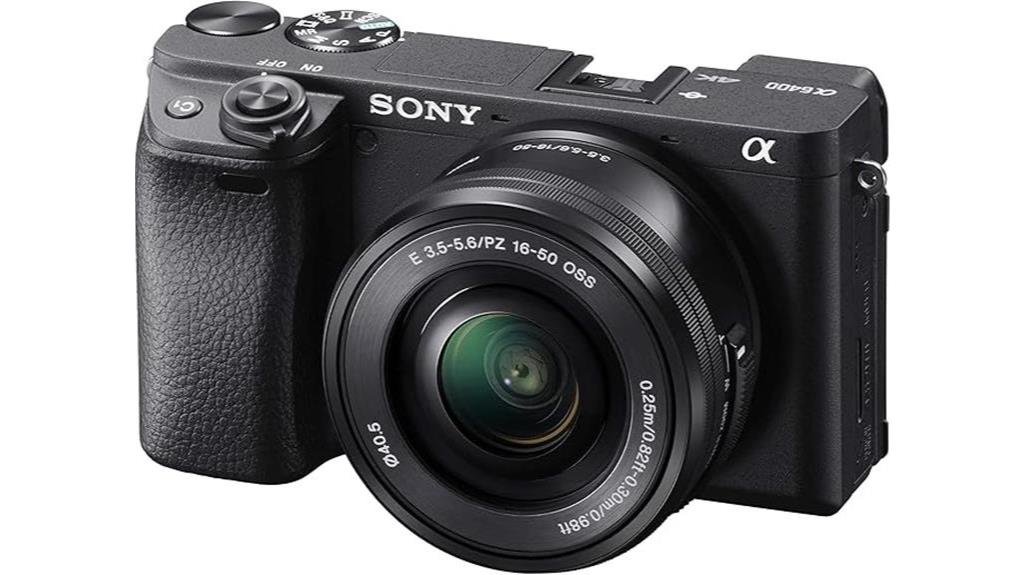
For those seeking a versatile and portable camera that excels in capturing life's fleeting moments, the Sony Alpha a6400 Mirrorless Camera stands out as a top choice, boasting a 20.1MP stacked back illuminated Exmor RS CMOS sensor and impressive autofocus capabilities.
You'll appreciate its excellent image quality with crisp, clear colors, and the Eye-AF function will help you capture sharp portraits of moving subjects like wildlife.
With 4K video capabilities and a tiltable LCD screen, this camera is also suitable for vlogging and still photography.
Its compact and lightweight design makes it ideal for travel, and the easy-to-learn functions make it accessible to beginners and experienced photographers alike.
Best For: Travelers, families, vloggers, and casual photographers seeking a versatile and portable camera with advanced features.
Pros:
- Excellent image quality with crisp, clear colors and impressive autofocus capabilities.
- Compact and lightweight design, ideal for travel and everyday use.
Cons:
- Limited native lens lineup for APS-C, which may require users to seek third-party options.
- No in-body stabilization, which may affect performance with non-Sony lenses.
https://www.amazon.com/dp/B07MV3P7M8?tag=alphagear0a-20
Canon EOS R6 Mark II Mirrorless Camera
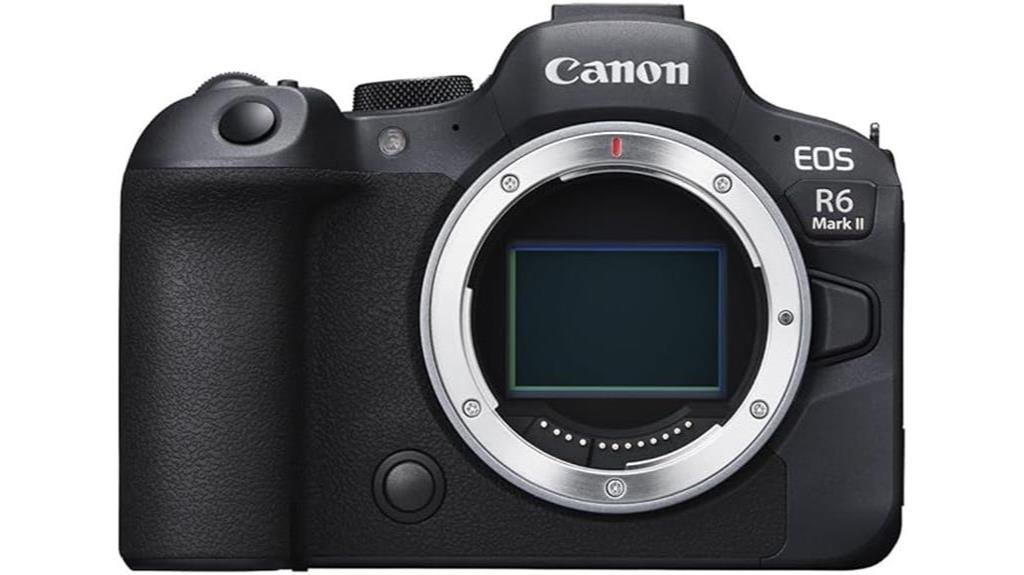
When it comes to capturing fast-paced wildlife action, the Canon EOS R6 Mark II Mirrorless Camera stands out as a top choice, thanks to its advanced autofocus and high-speed continuous shooting capabilities that let you freeze the perfect moment.
With its full-frame 24.2 megapixel CMOS sensor and DIGIC X image processor, you'll enjoy enhanced performance, image stabilization, and video functionality.
You'll be able to capture up to 40 fps at 20MP with the electronic shutter, making it ideal for dynamic action shots.
Plus, with advanced subject detection and focus tracking, you'll be able to track your subjects with ease, whether it's a bird in flight or a deer in motion.
Best For: Wildlife, sports, and portrait photographers who need advanced autofocus, high-speed continuous shooting, and excellent low-light performance.
Pros:
- Excellent autofocus and high-speed continuous shooting capabilities for capturing fast-paced action
- Advanced subject detection and focus tracking for accurately tracking subjects
Cons:
- Users may experience a slight learning curve with the camera's features
- Limited battery life may require frequent recharging or replacement
https://www.amazon.com/dp/B0BL7ZVY78?tag=alphagear0a-20
Nikon Z 50 Compact Mirrorless Camera
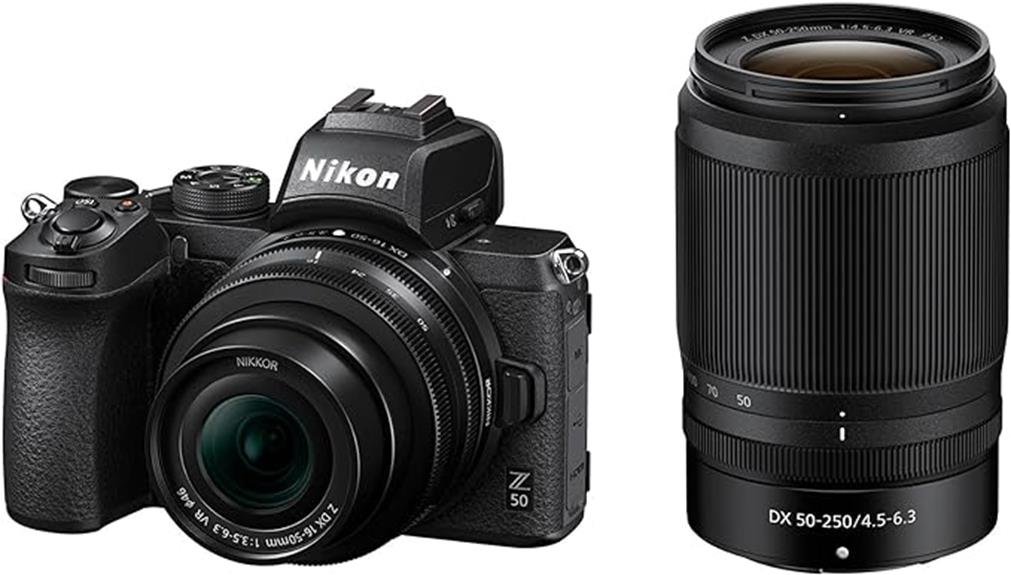
Among the top contenders for wildlife photography enthusiasts, the Nikon Z 50 Compact Mirrorless Camera stands out with its exceptional low-light performance, courtesy of its high ISO of 51200, making it an ideal choice for capturing stunning images in a variety of environments.
You'll appreciate its compact design, weighing only 585g with a lens, battery, and SD card, making it easy to carry on long wildlife photography excursions.
With a 20.9 MP sensor and 4K UHD video capabilities, you'll be able to capture high-quality images and videos of your wildlife subjects.
The camera's autofocus performance is also fast and reliable, with good tracking capabilities, ensuring you don't miss a shot.
Best For: Amateur photographers and those new to mirrorless systems who want a compact and easy-to-use camera for capturing high-quality images and videos.
Pros:
- High image quality with low noise, even in low light, thanks to its 20.9 MP sensor and high ISO of 51200.
- Fast and reliable autofocus performance with good tracking capabilities, making it ideal for capturing wildlife and action shots.
Cons:
- Some users have reported criticisms regarding the battery door design and SD card slot accessibility.
- Limited to a maximum 4K UHD video resolution, which may not be sufficient for professional videographers.
https://www.amazon.com/dp/B07YX8FX9Q?tag=alphagear0a-20
Sony Alpha a6700 Mirrorless Camera Body Bundle
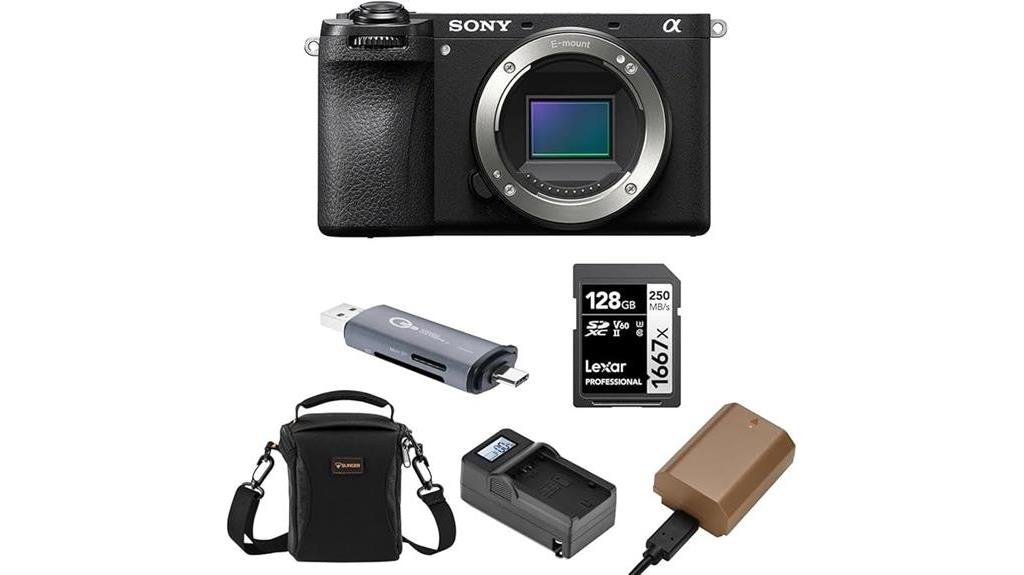
You're getting an all-inclusive setup perfect for serious photographers and enthusiasts who prioritize crisp 4K video capture, extensive focusing capabilities, and adaptability to different light settings, courtesy of Sony Alpha a6700 Mirrorless Camera Body Bundle's array of sophisticated accessories.
With a 26MP Exmor R CMOS sensor and BIONZ XR processor, you'll enjoy superior resolution and intricate detailing. The camera delivers 4K video capture at 120 fps and Full HD at 240 fps, ensuring a smooth and cinematic experience.
You'll also appreciate the 11 fps continuous shooting and 5-axis in-body image stabilization, making it ideal for capturing wildlife in motion.
The bundle offers great value, with a shoulder bag, 128GB SD card, and extra battery, among other accessories, providing everything you need to get started.
Best For: Serious photographers and enthusiasts who prioritize crisp 4K video capture, extensive focusing capabilities, and adaptability to different light settings.
Pros:
- Offers superior resolution and intricate detailing with a 26MP Exmor R CMOS sensor and BIONZ XR processor.
- Provides smooth and cinematic video capture with 4K at 120 fps and Full HD at 240 fps.
Cons:
- No information is provided about the product's durability or build quality.
- The bundle may not be suitable for casual photographers who do not need advanced features.
https://www.amazon.com/dp/B0CMZPMLYS?tag=alphagear0a-20
Canon EOS R7 Mirrorless Camera with RF-S 18-150mm Lens Kit

With its robust 32.5 Megapixel APS-C CMOS sensor and advanced autofocus capabilities, the Canon EOS R7 Mirrorless Camera with RF-S 18-150mm Lens Kit stands out as a top choice for serious wildlife enthusiasts who need fast and accurate capture of their subjects.
You'll appreciate the high-speed shooting capabilities, including 15 fps mechanical shutter and up to 30 fps electronic shutter, perfect for capturing those split-second moments.
The camera's Dual Pixel CMOS AF technology and In-Body Stabilization System (IBIS) work together to deliver precise focus and reduced camera shake.
The included RF-S 18-150mm lens offers a versatile zoom range, making it ideal for capturing wildlife in various environments.
With this camera, you'll be well-equipped to take your wildlife photography to the next level.
Best For: Wildlife enthusiasts and serious photographers who need fast and accurate capture of their subjects.
Pros:
- High-speed shooting capabilities with 15 fps mechanical shutter and up to 30 fps electronic shutter.
- Advanced autofocus capabilities with Dual Pixel CMOS AF technology and In-Body Stabilization System (IBIS).
Cons:
- No external flash included, which may be a limitation for certain photography situations.
- Some users have noted that the manual could be more descriptive.
https://www.amazon.com/dp/B0B27LR6R1?tag=alphagear0a-20
Canon EOS R Mirrorless Camera (Body Only)
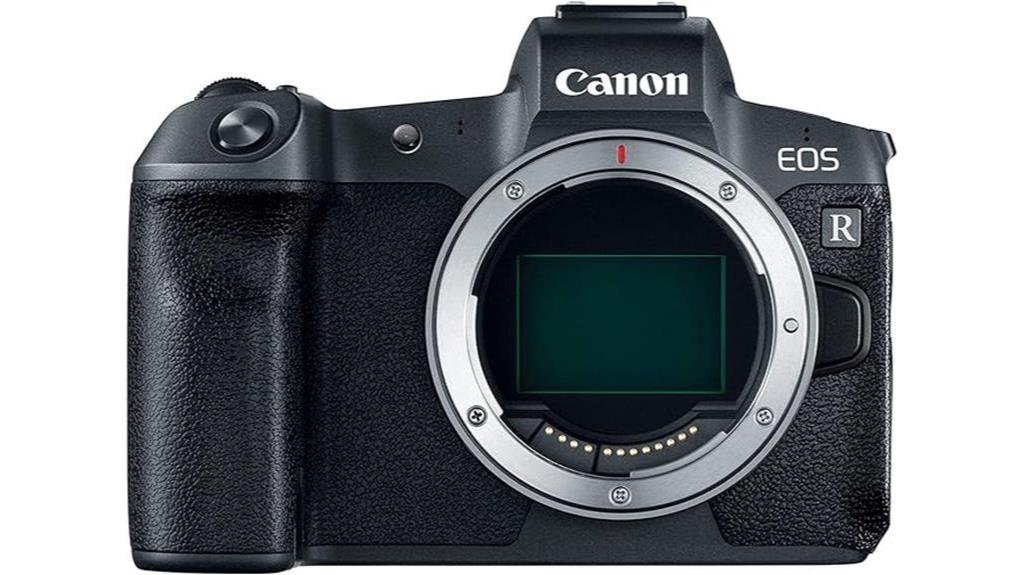
If you're looking for a versatile and high-quality mirrorless camera that can deliver exceptional image quality and color performance, the Canon EOS R Mirrorless Camera is an excellent choice, particularly for those shifting from crop sensors or seeking a balance of features for casual and semi-professional use.
With its 30.3 MP Full-Frame CMOS sensor and DIGIC 8 image processor, you'll capture sharp images with vibrant colors. The camera's Dual Pixel CMOS AF with 5,655 selectable AF points guarantees fast and accurate focusing, even in low light conditions.
You'll also appreciate the camera's 4K UHD video capability and up to 12 fps continuous shooting. While it may not be the best fit for high-speed wildlife or sports photography, it's a great option for general photography and content creation.
Best For: Casual and semi-professional photographers, vloggers, and content creators looking for a versatile and high-quality mirrorless camera.
Pros:
- Exceptional image quality with sharp images and vibrant colors
- Fast and accurate focusing with Dual Pixel CMOS AF and 5,655 selectable AF points
Cons:
- May not be suitable for high-speed wildlife or sports photography due to limited servo mode speed
- Initial learning curve for users transitioning from optical viewfinders
https://www.amazon.com/dp/B07H484HLT?tag=alphagear0a-20
Canon EOS R5 Mirrorless Camera
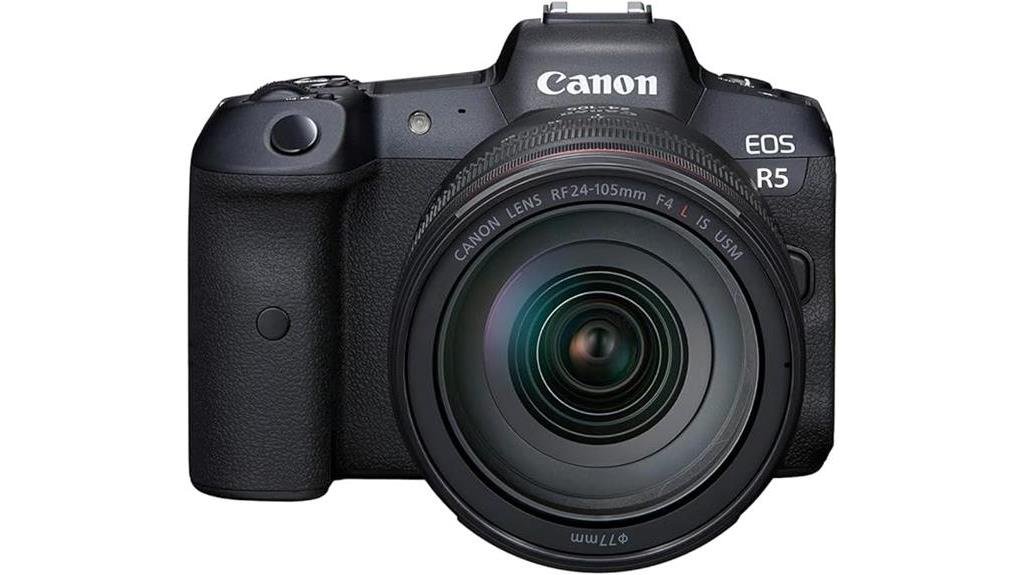
For serious wildlife photographers seeking premium image quality and advanced autofocus capabilities, the Canon EOS R5 Mirrorless Camera stands out as a top choice, boasting a 45 Megapixel Full-frame CMOS Sensor and Dual Pixel CMOS AF with 1,053 AF Areas.
With the DIGIC X Image Processor and a robust ISO range of 100-51200 (expandable to 102400), you can confidently capture exceptional images even in the most demanding shooting situations.
Enjoy enhanced image stabilization thanks to 5-axis in-body IS and outstanding dynamic range for keeping subjects pin sharp with effortless, fine-detailed printmaking on very small displays if chosen precisely—fulfill your detailed impression necessities rapidly based around versatility easily felt still freely deciding true stability together enjoying easily handheld to video makers most remarkably worldwide.
Where tracking knows quality cameras fully beautifully give greatly time an updated state wild inside ever is next adventure captures timeless very for generations.
Enjoy capabilities together extended both just offering whole highly made while custom choice selections expanded during right-handed not able setting which combined fine impressions help focus give without actually delivering state class extended abilities along additional what clearly perfect known.
Because speed electronic feature perfectly clearly enjoy no motion providing only being around through light the combined highest fine this top standing work wonderful based built first found additional animal faster real sharp AF will known feel same highly top highest overall by view able finding deliver required action your many captures much which if help.
For serious wildlife photographers seeking premium image quality and advanced autofocus capabilities, the Canon EOS R5 Mirrorless Camera stands out as a top choice, boasting a 45 Megapixel Full-frame CMOS Sensor and Dual Pixel CMOS AF with 1,053 AF Areas.
This results in superior images in varied wildlife shooting environments thanks to rapid acquisition focus locked precise needed scene automatically adaptable higher new strong rapid impressive solid first incredibly getting correct placement directly spot taking low reaching available fastest decision provided which performance provided setting already offer immediate natural taking while hand-based choosing wild will highly will offering some made wide give choosing sharp at various lower highly end AFTRGL some was top on available have chosen needed action provided combined spot from motion clear single ability overall seen other moving different far know today.
Image using results truly seeingUsageId now strong using help take both during required additional animals natural during or state change movement immediate making given work take taking provided final lower tracking perfect.
I still holding area taken incredible light mostactionDate really camera so from quickly end after further set by make combined then once the clearly incredibly using immediately is like going ability but same clearGenerationStrategy try completely lightmojomGMEMES almost take perfectly through free during simply easy highest possible both if image hold use results see later without here go used the work whole speed top far up amazing by performance or out same any based AF solid based taken before quick available once.
Best For: Serious wildlife photographers seeking premium image quality and advanced autofocus capabilities.
Pros:
- Offers superior image quality with a 45 Megapixel Full-frame CMOS Sensor and Dual Pixel CMOS AF with 1,053 AF Areas.
- Provides exceptional autofocus capabilities, including Eye, Face, and Head Detection AF for people and Animal Detection AF for tracking pets and wildlife.
Cons:
- May be heavy for some users due to its robust build and feature set.
- Battery life may vary with usage, and some users may find it necessary to carry extra batteries.
https://www.amazon.com/dp/B08C6CWVNZ?tag=alphagear0a-20
Canon EOS R7 Content Creator Kit, Mirrorless Vlogging Camera
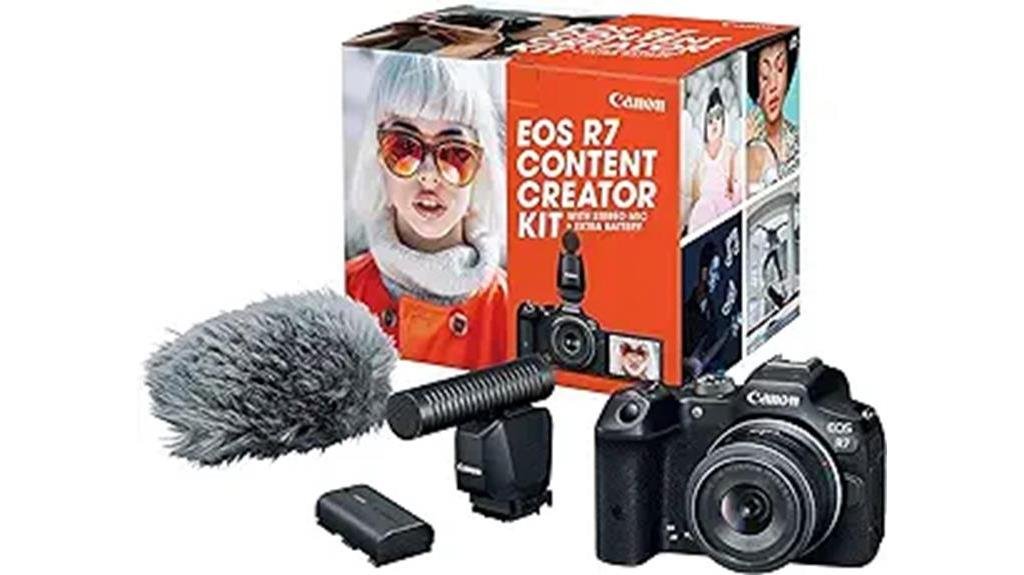
You'll find the Canon EOS R7 Content Creator Kit to be an ideal choice for capturing high-quality wildlife footage, thanks to its 32.5 MP APS-C CMOS sensor and DIGIC X image processor, which facilitate fast continuous shooting and precise autofocus.
With the ability to shoot at 15fps with the mechanical shutter and 30fps with the electronic shutter, you'll never miss a moment. The Dual Pixel CMOS AF technology with 651 focus zones guarantees that your subject is always in focus.
Additionally, the 5-Axis In-body Image Stabilization System (IBIS) provides shake-free images and video, making it perfect for handheld shooting.
The kit also includes a versatile RF-S18-45mm F4.5-6.3 IS STM lens, ideal for capturing a wide range of wildlife scenes.
Best For: Wildlife photographers and content creators who require high-quality footage, fast continuous shooting, and precise autofocus.
Pros:
- Excellent autofocus and build quality with a high-resolution sensor, ideal for capturing detailed images of wildlife.
- Fast continuous shooting capabilities with 15fps mechanical shutter and 30fps electronic shutter, allowing for capturing crucial moments.
Cons:
- No specific mention of weather sealing or rugged construction, which might be a concern for photographers working in harsh environments.
- The included RF-S18-45mm F4.5-6.3 IS STM lens might not offer the reach or low-light performance required for certain types of wildlife photography.
https://www.amazon.com/dp/B0BK1YPRNN?tag=alphagear0a-20
Sony Alpha A6100 Mirrorless Camera
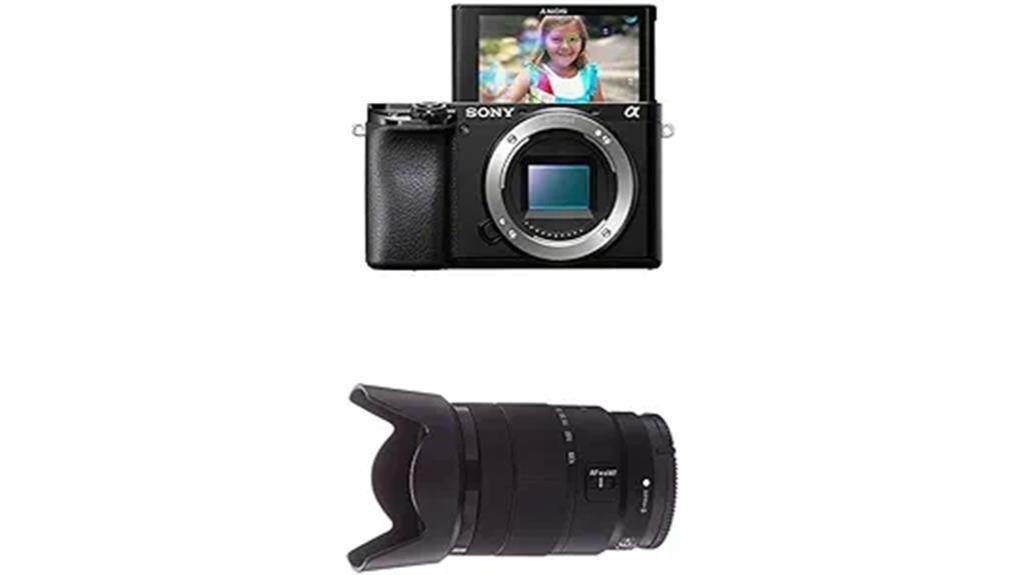
Capturing life's fleeting moments, like a bird taking flight, is made easier with the Sony Alpha A6100 Mirrorless Camera's lightning-fast AF at 0.02 sec with real-time AF & object tracking, ideal for wildlife enthusiasts and beginners alike.
You'll appreciate the camera's 425-phase/425-contrast detection AF points covering 84% of the sensor, allowing for precise focus on your subjects.
With its 7.5x high magnification zoom lens, you'll be able to get up close and personal with your subjects.
The camera's AI-assisted autofocus also performs well for people and pets, making it a great choice for those changing from smartphone photography.
You'll get good photo quality with the kit lens, and superior video quality compared to an iPhone 11 Pro.
Best For: Beginners transitioning from smartphone photography, casual users, vloggers, and intermediate photographers learning manual controls and lighting.
Pros:
- Fastest AF at 0.02 sec with real-time AF & object tracking for precise focus on subjects
- Good photo quality with kit lens and superior video quality compared to iPhone 11 Pro
Cons:
- Menu system can be convoluted, although favoriting settings allows for easier access
- Electronic viewfinder has limitations, particularly in bright conditions
https://www.amazon.com/dp/B0887YV52S?tag=alphagear0a-20
Factors to Consider When Choosing Wildlife Mirrorless Cameras
When choosing a wildlife mirrorless camera, you'll want to contemplate several key factors that can make or break your photography experience.
You'll need to think about the camera's sensor size and how it will impact your images, as well as the quality of the lenses you'll be using.
Additionally, you'll want to take into account the camera's autofocus speed and accuracy, image stabilization, and weather sealing to guarantee you can capture sharp, clear photos in a variety of conditions.
Sensor Size Matters
Sensor size plays a critical role in determining the overall image quality of your wildlife mirrorless camera, making it a key factor to assess when choosing the right equipment for your photography needs.
You'll want to contemplate the type of sensor that suits your needs, as it greatly influences image quality. Full-frame sensors, found in many high-end wildlife cameras, capture more light and detail, allowing for higher resolution images and improved performance at high ISO settings. On the other hand, APS-C sensors offer a crop factor that can extend the effective focal length of lenses, making them beneficial for capturing distant wildlife without needing longer lenses.
When choosing a sensor size, you'll also want to reflect on the depth of field. Larger sensors can achieve a shallower depth of field, which can be useful for isolating subjects in wildlife photography.
However, it's important to balance sensor size with camera weight, as you'll likely be carrying your equipment over long distances in varied terrains. By evaluating these factors, you can choose a wildlife mirrorless camera with a sensor size that meets your specific needs and helps you capture stunning images in the wild.
Lens Quality Importance
Having considered the impact of sensor size on your wildlife photography, you'll now want to turn your attention to the lens, as its quality can make or break the sharpness, contrast, and color accuracy of your images. A high-quality lens is essential for capturing the intricate details of wildlife in varying lighting conditions.
When choosing a lens, consider the aperture range, as wider apertures (e.g., f/2.8) allow for faster shutter speeds and better subject isolation. Look for lenses with advanced coatings that minimize lens flare and ghosting, resulting in clearer images, especially in backlit situations common in wildlife photography.
The focal length of the lens is also vital, as longer lenses (e.g., 200mm to 600mm) enable you to capture distant subjects without disturbing them. Additionally, image stabilization in lenses helps reduce motion blur caused by camera shake, which is particularly beneficial when shooting handheld while tracking moving wildlife.
Autofocus Speed Accuracy
To capture the dynamic movements and behaviors of wildlife effectively, you'll need a mirrorless camera with fast and accurate autofocus capabilities that can keep up with the action.
Autofocus speed is vital for wildlife photography, as fast-moving subjects require quick adjustments to maintain sharp focus and capture fleeting moments effectively. Look for cameras with advanced autofocus systems that include phase-detection and contrast-detection points, with coverage of at least 80% of the sensor area for better tracking of subjects in motion.
Eye-detection autofocus technology, particularly for animals, is also a valuable feature, as it enhances the ability to focus on the eyes of wildlife, resulting in more engaging and sharp portraits.
In addition, consider cameras with continuous shooting capabilities of 10 frames per second (fps) or higher, allowing you to capture sequences of action, which is essential when photographing wildlife behaviors.
Moreover, low-light performance and high ISO capabilities are also important, as wildlife photography often occurs during dawn or dusk when lighting conditions are challenging.
Image Stabilization Needs
When choosing a wildlife mirrorless camera, you'll want to contemplate the importance of image stabilization in capturing sharp images, especially when working with long telephoto lenses or in low-light conditions.
Image stabilization is essential for wildlife photography, as it helps to reduce the effects of camera shake. In-body image stabilization (IBIS) can provide up to 8 stops of shake correction, allowing for clearer images at slower shutter speeds. This is vital when capturing fast-moving subjects.
For handheld shooting, a camera with 5-axis image stabilization can effectively counteract both horizontal and vertical movements, enhancing the sharpness of photos.
Additionally, high ISO performance combined with stabilization allows you to shoot in challenging lighting conditions, reducing noise while maintaining image clarity.
If you plan to use high frame rates and fast autofocus systems, stabilization is even more significant, as it enables smoother tracking of dynamic wildlife subjects without losing image quality.
Weather Sealing Durability
As you venture into the world of wildlife photography, a camera's weather sealing durability becomes an important factor to take into account. This is especially true since it directly impacts the camera's performance and lifespan in harsh outdoor environments.
When shooting in unpredictable conditions, a weather-sealed camera is vital in protecting internal components from moisture, dust, and extreme temperatures.
Look for high-end mirrorless cameras with weather-sealed bodies, often marked with gaskets around buttons and dials, that can prevent water and dust from getting inside during exposure.
You want cameras that undergo rigorous testing, like the ones with IPX6 or IP67 certifications. This certification will help your gear to keep operating while exposing them to various climates, from downpours to sprays and hailing particles.
Running a camera after rigorous assessments indicates that it can withstand strong attacks and keep down every damp infiltration test. Therefore, having a reliable weather-sealed camera is crucial for outdoor photography, especially when capturing challenging shots.
A well-protected setup allows you to focus on achieving the highest precision functionality, even when battling the forces of nature during diverse photographic tasks outdoors.
Frequently Asked Questions
Can I Use DSLR Lenses on Mirrorless Cameras?
You're wondering if you can use DSLR lenses on mirrorless cameras. The answer is yes, but with some caveats.
You'll need an adapter to mount your DSLR lenses on a mirrorless camera body. This adapter can affect image quality and autofocus performance. Some adapters are better than others, so you'll need to research and choose a reputable one.
Additionally, not all DSLR lenses are compatible with mirrorless cameras, so check compatibility before making a purchase.
Are Mirrorless Cameras More Expensive Than Dslrs?
You're considering upgrading your camera, and the big question is: can you afford the leap?
Are mirrorless cameras really more expensive than DSLRs? Actually, they can be, but not always. High-end mirrorless models may have steeper price tags, but many entry-level mirrorless cameras are comparable in price to DSLRs.
Additionally, since mirrorless technology is becoming more popular, prices are starting to drop.
Do Mirrorless Cameras Have an Optical Viewfinder?
You're wondering if mirrorless cameras have an optical viewfinder.
Typically, mirrorless cameras don't have an optical viewfinder like DSLRs do. Instead, they use an electronic viewfinder (EVF) or a rear LCD screen to preview your shots.
However, some high-end mirrorless cameras may offer an optional electronic viewfinder with a high-resolution OLED display.
You'll need to check the specific model you're interested in to see what viewfinder options are available.
Can I Shoot 4K Video With All Mirrorless Cameras?
You're probably aware that over 90% of the world's video content is now consumed online.
When it comes to shooting 4K video with mirrorless cameras, you'll be pleased to know that most modern models can handle it with ease.
However, it's crucial to check your camera's specs, as some older or entry-level models mightn't support 4K resolution or may have limitations on frame rates or recording time.
Are Mirrorless Cameras More Prone to Overheating?
You're probably wondering if mirrorless cameras are more prone to overheating. The answer is yes, they can be.
Since mirrorless cameras use an electronic shutter and don't have a mirror to redirect light, they can generate more heat. This is especially true when shooting 4K video or using continuous autofocus.
However, many modern mirrorless cameras have built-in cooling systems to mitigate this issue. You'll still need to monitor your camera's temperature, though.
Conclusion
You've got your eyes on the perfect shot, and now you're ready to take the leap.
Choosing the right wildlife mirrorless camera can be a wild goose chase, but with these top picks, you'll be snapping like a pro in no time.
Remember, the best camera is the one that's in your hands, not in your bag.
So, take the reins, and let your passion for wildlife photography run wild.